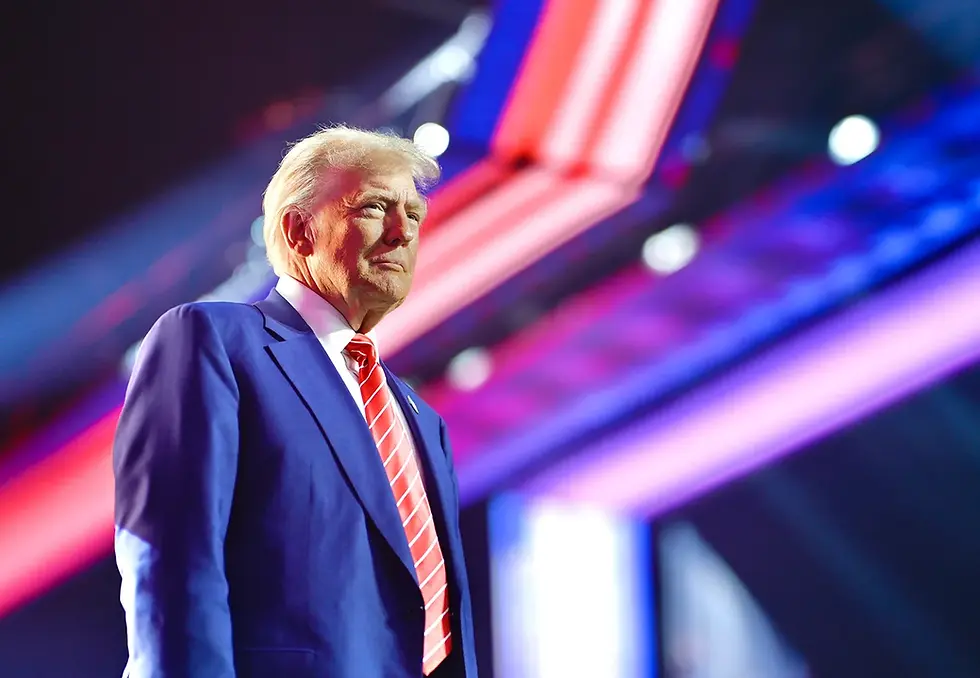Trump In Crosshairs of Sex Scandal
- Mohammad Ali
- Aug 1, 2025
- 4 min read
Updated: Aug 23, 2025
As US President Donald Trump meets British Prime Minister Keir Starmer in Scotland, the Jeffrey Epstein scandal remains a global shadow—casting doubts on political credibility and the integrity of institutions everywhere. Despite being thousands of miles away from Washington, Trump’s handling of the Epstein controversy has followed him abroad, raising concerns about transparency, trust, and a broader pattern of populist politics.
During a bilateral meeting at Turnberry, Scotland, Trump offered a new version of the story behind his relationship with Epstein. He claimed he expelled Epstein from Mar a Lago, Trump’s resort in Florida, decades ago after Epstein “stole people who worked for me,” describing him as persona non grata. He reiterated, as he has before, that he never visited Epstein’s private island—despite accusations to the contrary.

According to the Wall Street Journal, the Justice Department had told Trump at a meeting with him at The White House in May that his name is among many in the Epstein files. Attorney General Pamela Jo Bondi also told the president that Justice Department decided to not release more of Jeffrey Epstein documents because of the presence of child pornography and the need to protect victims. When Justice Department officials reviewed what Attorney General Pam Bondi called a “truckload of documents” related to Jeffrey Epstein earlier this year, they reportedly discovered that Donald Trump’s name appeared multiple times.
So last week, when the administration did a U-turn on releasing 100,000-odd documents related to Epstein – amid conspiracy theories of deep-state paedophile rings, which Trump is alleged to have promoted – the president was on the backfoot with steep decline in his popularity reported by several polls. According to Reuters/Ipsos, as of mid July 2025, 69 percent of Americans believe the Trump administration is hiding up details about Epstein and his so called “client list”.
Approval of Trump’s handling of the matter stands at just 17 percent overall—and only 35 percent among Republicans. His net approval rating has dropped to around −9.8 percent, with Epstein serving as a dominant drag on the public perception about him. Gen Z voters are particularly disillusioned: 41 percent believe Trump knew a lot about Epstein’s crimes, and 42 percent think they were close friends—underscoring deep skepticism among younger demographics.
Trump’s toughest opponent turned out to be his own base. Even after House Republicans blocked Democrats on a resolution to force a vote on releasing the files, and the speaker, Mike Johnson, withheld from the floor a similar resolution, the far right would not be mollified.
“Dangling bits of red meat no longer satisfies. The People … want the whole steak dinner and will accept nothing less,” Georgia congresswoman Marjorie Taylor Greene posted on X.
Once a unified bloc, parts of Trump’s base are now divided. Prominent MAGA influencers like Alex Jones and Laura Loomer, once staunch defenders, have criticized the administration’s handling of the Epstein controversy, warning it could unravel Trump’s coalition. Donald Trump is angry, but this time his ire is directed at a new audience: his own MAGA supporters. In a blistering post on Truth Social, Trump continued to push his backers to stop talking about Jeffrey Epstein, an issue that has driven what appears to be one of the most significant rifts between him and the political movement he built up.
“Let those weaklings continue forward and do the Democrats work,” he wrote. “Don’t even think about talking of our incredible and unprecedented success, because I don't want their support anymore.”
Trump later told reporters at the Oval Office that he had “lost faith in certain people” because “they got duped by the Democrats” on the issue — even though it was Republicans who primarily pushed for more on the Epstein files. Trump’s message was a significant escalation, reflecting that his supporters aren’t all following his lead and adopting his messaging as they usually do. It’s also left MAGA-aligned media at a loss of what to do, torn between much of the base that continues to call for more documents related to Epstein, the late financier and convicted sex offender, and Trump, who insists they should drop the issue.
Trump’s new explanations may resonate with some supporters. But they come at a political moment when the demand for factual accountability stretches beyond domestic shores. As The New Yorker notes, the Epstein scandal may be the ultimate test of Trump’s ability to maintain base loyalty while facing legitimate questions about his own biography and alliances.
“This is a major problem and could hurt turnout in the midterms,” said a Republican strategist familiar with Trump’s political operation. “It signals betrayal to those who believed the president would expose the deep state. His team made promises, then doubled down. “For the base that believes the deep state is real and that Epstein was part of it, this feels like the ultimate knife in the back,” the strategist added.
I think globally this scandal needs to be seen beyond the U.S. partisan framing: the Epstein question isn't just about Trump—it’s about how leaders respond to scandals they once encouraged, how they manage promises of transparency, and how their followers reconcile contradictory truths. For now, Trump is banking on loyalty, denial, and distraction. But as global journalism holds leaders to account and institutional pressure mounts, the Epstein question may not just test Trump's credibility—it may become a benchmark for political trust in an era of post-truth polarization.
.png)








Comments